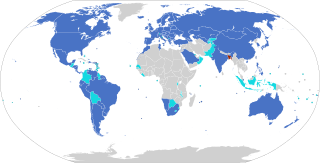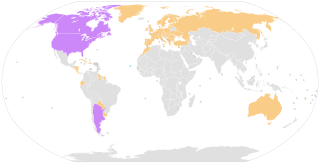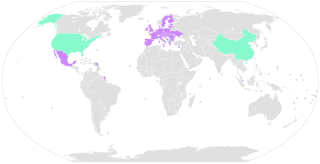Conflict of laws is the set of rules or laws a jurisdiction applies to a case, transaction, or other occurrence that has connections to more than one jurisdiction. This body of law deals with three broad topics: jurisdiction, rules regarding when it is appropriate for a court to hear such a case; foreign judgments, dealing with the rules by which a court in one jurisdiction mandates compliance with a ruling of a court in another jurisdiction; and choice of law, which addresses the question of which substantive laws will be applied in such a case. These issues can arise in any private-law context, but they are especially prevalent in contract law and tort law.
The Convention for the Unification of certain rules relating to international carriage by air, commonly known as the Warsaw Convention, is an international convention which regulates liability for international carriage of persons, luggage, or goods performed by aircraft for reward.

The Hague Convention Abolishing the Requirement of Legalisation for Foreign Public Documents, the Apostille Convention, or the Apostille Treaty, is an international treaty drafted by the Hague Conference on Private International Law (HCCH). It specifies the modalities through which a document issued in one of the contracting states can be certified for legal purposes in all the other contracting states. A certification under the terms of the convention is called an apostille or Hague apostille. It is an international certification comparable to a notarisation in domestic law, and normally supplements a local notarisation of the document. If the convention applies between two countries, such an apostille is sufficient to certify a document's validity, and removes the need for double-certification, by the originating country and then by the receiving country.
The Place of the Relevant Intermediary Approach (PRIMA) is a conflict of laws rule applied to the proprietary aspects of security transactions, especially collateral transactions. It is an alternative approach to the historically important look-through approach, and was in its earliest form the basis for the initial draft of the Hague Securities Convention.

The Hague Conference on Private International Law (HCCH) is an intergovernmental organisation in the area of private international law, that administers several international conventions, protocols and soft law instruments.

The Hague Convention on the Civil Aspects of International Child Abduction or Hague Abduction Convention is a multilateral treaty developed by the Hague Conference on Private International Law (HCCH) that provides an expeditious method to return a child internationally abducted by a parent from one member country to another.
In conflict of laws, the choice of law rules for tort are intended to select the lex causae by which to determine the nature and scope of the judicial remedy to claim damages for loss or damage suffered.

The Convention on the Taking of Evidence Abroad in Civil or Commercial Matters—more commonly referred to as the Hague Evidence Convention—is a multilateral treaty which was drafted under the auspices of the Hague Conference on Private International Law (HCPIL). The treaty was negotiated in 1967 and 1968 and signed in The Hague on 18 March 1970. It entered into force in 1972. It allows transmission of letters of request from one signatory state to another signatory state without recourse to consular and diplomatic channels. Inside the US, obtaining evidence under the Evidence Convention can be compared to comity.
In conflict of laws, habitual residence is the standard used to determine the law which should be applied to determine a given legal dispute or legal entitlement. It can be contrasted with the law on domicile, traditionally used in common law jurisdictions to do the same thing.

The Hague Convention on the Law Applicable to Trusts and on their Recognition, or Hague Trust Convention is a multilateral treaty developed by the Hague Conference on Private International Law on the Law Applicable to Trusts. It concluded on 1 July 1985, entered into force 1 January 1992, and is as of September 2017 ratified by 14 countries. The Convention uses a harmonised definition of a trust, which is the subject of the convention, and sets Conflict rules for resolving problems in the choice of the applicable law. The key provisions of the Convention are:

The Convention on the Law Applicable to Contractual Obligations 1980, or the "Rome Convention", is a measure in private international law or conflict of laws which creates a common choice of law system in contracts within the European Union. The convention determines which law should be used, but does not harmonise the substance. It was signed in Rome, Italy on 19 June 1980 and entered into force in 1991.

The Hague Convention on parental responsibility and protection of children, or Hague Convention 1996, officially Convention of 19 October 1996 on Jurisdiction, Applicable Law, Recognition, Enforcement and Co-operation in respect of Parental Responsibility and Measures for the Protection of Children or Hague Convention 1996 is a convention of the Hague Conference on Private International Law. It covers civil measures of protection concerning children, ranging from orders concerning parental responsibility and contact to public measures of protection or care, and from matters of representation to the protection of children's property. It is therefore much broader in scope than two earlier conventions of the HCCH on the subject.

Vita Food Products Inc v Unus Shipping Co Ltd [1939] UKPC 7, is a leading decision of the Judicial Committee of the Privy Council on the conflict of laws. The case stands for the proposition that an express choice of law clause in a contract should be honoured as long as the agreement was bona fide and not against public policy. The case is significant in the field of contract law, as it greatly expanded the ability of parties to choose the jurisdiction of their contacts.
International Commercial Law is a body of legal rules, conventions, treaties, domestic legislation and commercial customs or usages, that governs international commercial or business transactions. A transaction will qualify to be international if elements of more than one country are involved.
International matrimonial law is an area of private international law. The area specifically deals with relations between spouses and former spouses on issues of marriage, divorce and child custody. In the last 50 years, the States Members of the Hague Conference on Private International Law have attempted to harmonize domestic matrimonial laws and judicial rulings across international borders in these areas.

The Hague Convention on the International Recovery of Child Support and Other Forms of Family Maintenance, also referred to as the Hague Maintenance Convention or the Hague Child Support Convention is a multilateral treaty governing the enforcement of judicial decisions regarding child support extraterritorially. It is one of a number of conventions in the area of private international law of the Hague Conference on Private International Law in 2007. The convention is open to all states as well as to Regional Economic Integration Organizations as long as they are composed of sovereign states only and have sovereignty in the content of the convention. The convention entered into force on 1 January 2013 between Norway and Albania, with Bosnia-Herzegovina (2013), Ukraine (2013), the European Union, Montenegro (2017), United States (2017), Turkey (2017), Kazakhstan (2017), Brazil (2017), Honduras (2017), Belarus (2018), Guyana (2020), Nicaragua (2020), United Kingdom (2021), Serbia (2021) and New Zealand (2021) following suit. Because the EU acceptance of the convention applies in 27 EU countries, the convention applies in 42 countries worldwide.

The Hague Divorce Convention, officially Convention on the Recognition of Divorces and Legal Separations is a convention concluded by the Hague Conference on Private International Law (HCCH). It regulates the recognition of divorces and legal separations provided they have been performed according to the correct legal process in the state where the divorce was obtained. Not all divorces need to be recognized under the convention. Only those divorces obtained in a state where ;

The Hague choice of court convention, formally the Convention of 30 June 2005 on Choice of Court Agreements, is an international treaty concluded within the Hague Conference on Private International Law. It was concluded in 2005, and entered into force on 1 October 2015. The European Union, Denmark, Mexico, Singapore and the United Kingdom are parties to the convention. China, Israel, North Macedonia, Ukraine and the United States signed the convention, but did not ratify.

The Hague Protection of Adults Convention, formally the Convention on the International Protection of Adults, is a convention concluded by the Hague Conference on Private International Law in 2000. The convention entered into force in 2009 and currently applies in ten states. The convention is aimed at the protection of vulnerable adults, persons who are "by reason of an impairment or insufficiency of their personal faculties, are not in a position to protect their interests". The convention

Cox v Ergo Versicherung AG[2014] UKSC 22 is a judicial decision of the Supreme Court of the United Kingdom relating to the conflict of laws and the assessment of damages following a road traffic accident.













